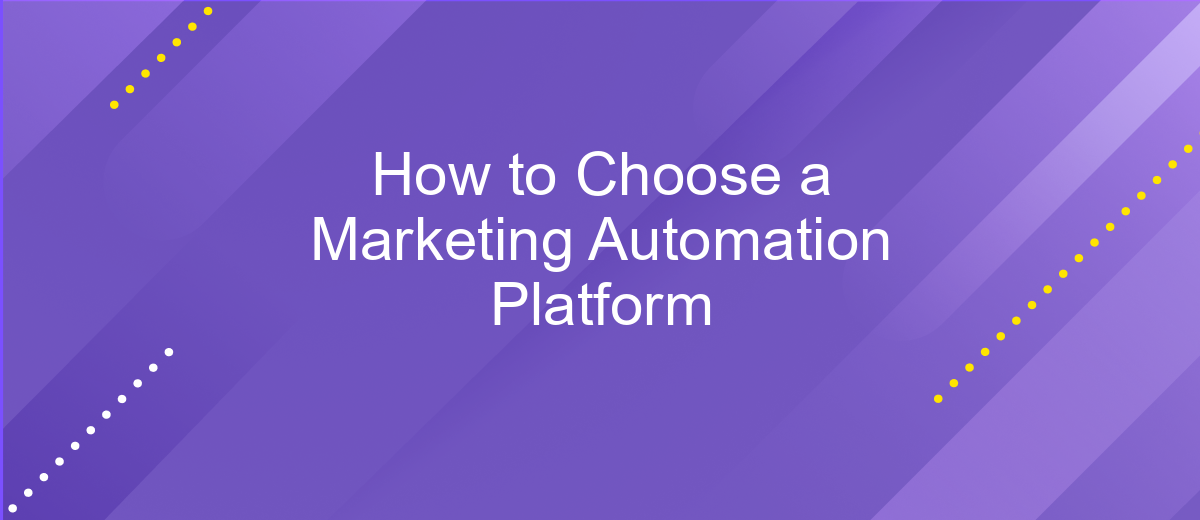How to Choose a Marketing Automation Platform
Choosing the right marketing automation platform is crucial for maximizing your business's efficiency and growth. With countless options available, identifying the perfect fit can be overwhelming. This guide aims to simplify the decision-making process by highlighting key factors to consider, such as features, scalability, and integration capabilities. By understanding your unique business needs, you can select a platform that enhances your marketing strategy and drives success.
Define Your Business Needs
Before selecting a marketing automation platform, it's crucial to clearly define your business needs. Understanding what you aim to achieve with automation will guide you in choosing the right tools and features. Consider your current marketing processes and identify areas that require improvement or streamlining. This will help you pinpoint the functionalities that are essential for your business.
- Identify key marketing goals and objectives.
- Evaluate existing marketing processes and workflows.
- Determine the specific features and integrations needed.
- Assess the scalability requirements for future growth.
- Consider the budget constraints and ROI expectations.
Once you have a clear understanding of your business needs, you can begin to explore different marketing automation platforms that align with your objectives. This approach not only ensures that you invest in a solution that meets your current demands but also supports your future growth. By focusing on your unique requirements, you'll be better positioned to select a platform that enhances efficiency and drives successful marketing campaigns.
Evaluate Platform Features and Functionality

When evaluating marketing automation platforms, it's crucial to assess the features and functionality that align with your business needs. Start by identifying core features such as email marketing, lead scoring, customer segmentation, and analytics. Ensure the platform offers robust data management capabilities to handle your customer information securely. Look for user-friendly interfaces and customizable dashboards that allow your team to efficiently manage campaigns and track performance metrics. Consider the scalability of the platform, ensuring it can grow alongside your business.
Integration capabilities are another vital aspect to consider. A platform that seamlessly integrates with your existing tools can streamline operations and enhance productivity. Services like ApiX-Drive can facilitate these integrations, allowing you to connect various applications without extensive technical knowledge. Additionally, evaluate the platform's customer support and training resources, as these can significantly impact your team's ability to effectively utilize the system. Conduct a thorough analysis to ensure the platform meets your specific marketing objectives and provides a solid return on investment.
Consider Scalability and Flexibility

When selecting a marketing automation platform, it's crucial to consider its scalability and flexibility. As your business grows, your marketing needs will evolve, and your chosen platform should be able to accommodate these changes without significant disruptions. A scalable platform ensures that you can handle increased data volumes, user numbers, and campaign complexities seamlessly.
- Evaluate the platform's ability to integrate with other tools and systems you currently use or plan to use in the future.
- Assess whether the platform can support additional features or modules as your business requirements expand.
- Consider the ease with which the platform can adapt to new marketing channels and trends.
Flexibility is equally important, as it allows your team to customize workflows and processes to suit specific business needs. A flexible platform empowers your marketing team to experiment with different strategies and quickly implement changes based on performance insights. By prioritizing scalability and flexibility, you ensure that your marketing automation solution remains a valuable asset as your business continues to grow and adapt to an ever-changing market landscape.
Review Vendor Support and Resources

When selecting a marketing automation platform, evaluating the vendor's support and resources is crucial. A robust support system can significantly impact your experience, ensuring smooth implementation and ongoing success. Begin by researching the vendor's reputation for customer support, checking reviews and testimonials from existing users.
Consider the availability of training materials and resources. Comprehensive documentation, video tutorials, and webinars can empower your team to fully leverage the platform's capabilities. Additionally, assess the vendor's commitment to continuous improvement and updates, which can indicate long-term reliability and innovation.
- 24/7 customer support availability
- Dedicated account managers or support teams
- Access to online knowledge bases and community forums
- Regular software updates and feature enhancements
Finally, evaluate the vendor's onboarding process and any additional services they offer, such as consulting or customization. A well-structured onboarding program can ease the transition and ensure your team is well-prepared to utilize the platform effectively. By thoroughly reviewing vendor support and resources, you can make a more informed decision that aligns with your business needs.
- Automate the work of an online store or landing
- Empower through integration
- Don't spend money on programmers and integrators
- Save time by automating routine tasks
Conduct a Proof of Concept and Implementation Plan
Before fully committing to a marketing automation platform, it's crucial to conduct a proof of concept (PoC) to evaluate its capabilities in your specific business context. Start by identifying a small project or campaign that can serve as a test case. This will help you assess the platform's features, ease of use, and integration capabilities with your existing systems. During this phase, involve key stakeholders to gather diverse insights and ensure the platform aligns with your strategic goals. Document the results and feedback to make an informed decision.
Once the PoC is successful, develop a detailed implementation plan. This plan should outline the steps required to integrate the platform into your operations, including timelines, resources, and responsibilities. Consider using integration services like ApiX-Drive to streamline the process and ensure seamless data flow between systems. ApiX-Drive can automate data exchange, reducing manual efforts and minimizing errors. Regularly review the implementation progress and adjust the plan as needed to address any challenges that arise, ensuring a smooth transition to the new platform.
FAQ
What factors should I consider when choosing a marketing automation platform?
How important is integration with other tools when selecting a marketing automation platform?
What are the key features to look for in a marketing automation platform?
How can I evaluate the ease of use of a marketing automation platform?
What role does customer support play in choosing a marketing automation platform?
Time is the most valuable resource in today's business realities. By eliminating the routine from work processes, you will get more opportunities to implement the most daring plans and ideas. Choose – you can continue to waste time, money and nerves on inefficient solutions, or you can use ApiX-Drive, automating work processes and achieving results with minimal investment of money, effort and human resources.


